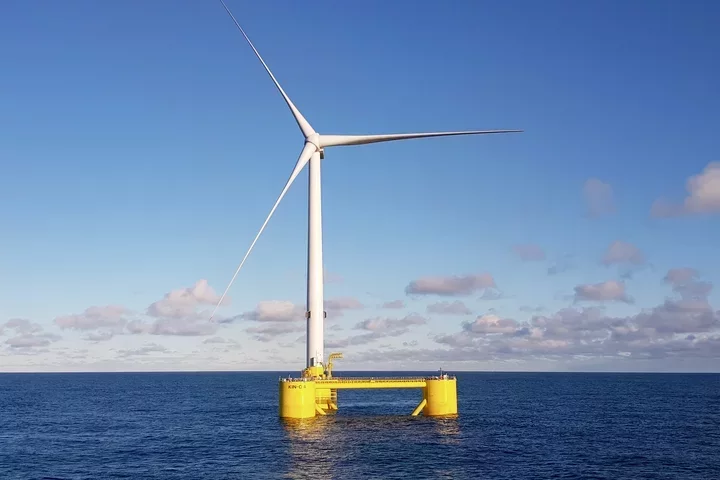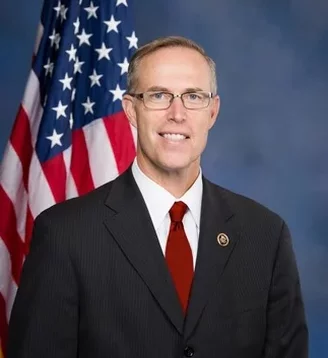A 9.5-megawatt floating wind turbine deployed at the Kincardine Offshore Wind project, located off the coast of Aberdeen, Scotland. Photo courtesy of Principle Power.
###
PREVIOUSLY:
###
On his first day in office, President Donald Trump fulfilled a long-held promise to block offshore wind development, issuing a sweeping Executive Order to halt leasing and permitting for new wind energy projects slated on the outer continental shelf. While the ban has sparked widespread concern over the future of wind energy in the United States, it doesn’t target lease areas that are already paid for, including those within the Humboldt Wind Energy Area, located 20 miles west of Eureka.
Those lease areas — along with three other sites off the coast of Morro Bay — were sold to multinational wind energy developers in December 2022 during the Bureau of Ocean Energy Management’s first-ever offshore wind lease sale on the West Coast. Those leases were paid in full shortly after the auction, and there are no pending federal approvals for the proposed projects at this time.
While the ban does not affect existing lease areas, it does direct the Secretary of the Interior, in consultation with the Attorney General, to conduct “a comprehensive review of the ecological, economic, and environmental necessity of terminating or amending any existing wind energy leases,” the order states.
To get a better sense of how the offshore wind ban is playing out on the national level, we called up our North Coast congressional representative Jared Huffman for more information. Our conversation has been edited for length and clarity.
###
Lost Coast Outpost: Before we get into the topic at hand, can you describe the current scene in Washington, D.C? How are things feeling now that Trump is in office and how does it compare to his first term?
Huffman: It is different. It’s off to, obviously, a very rapid start with these executive orders, but the other thing that’s different is that there’s almost complete deference to Trump from congressional Republicans. Under Donald Trump, this has ceased to be a co-equal branch of government — it’s simply an arm of his administration. … Congress is supposed to be a check and balance in our system of government to prevent presidents from turning into kings, right? That was the whole idea, and right now we have a Congress where the majority seems perfectly fine with President Trump just claiming unthinkable authoritarian powers and doing these bizarre and almost laughably ignorant things — proposing to rename the Gulf of Mexico, acquire Greenland, take back the Panama Canal — and these guys are just nodding and smiling. It is strange to watch the transformation of these members of Congress who swore to uphold the Constitution [and] are supposed to be here to exercise their Article I power as an independent branch of government, but it sure looks more like a cult from where I sit.
LoCO: I’d like to focus our conversation on Trump’s crackdown on wind energy in the United States. As I understand, his executive order temporarily halts permitting and leasing for new offshore wind energy projects. What else should people know about the order?
Huffman: In terms of what affects us on the North Coast, the halt of leasing is not that big a deal because our leases have already been held and the leasing rights are already acquired. It’s not very helpful that permitting is paused as well — hopefully, that’s only temporary and the government can get back to doing what it’s supposed to do. I think this will not be the last obstacle the Trump Administration throws in front of clean energy. They hate it because they’re all in for fossil fuels. Wind power and other clean energy threaten the fossil fuel monopoly, so they’re going to do really extreme and overreaching things, but that shouldn’t mean that we allow them to win. I don’t think [this executive order] means the end of our incredibly promising offshore wind project. It simply means we’re going to have to be strategic about how we continue to make progress, and it probably means some delay.
LoCO: In previous discussions with the Harbor Bay Harbor, Recreation and Conservation District’s leadership, I’ve been told that the Trump Administration’s anticipated actions against the offshore wind industry will slow things down, but they’re not likely to lead to a “complete elimination of the industry.” Can you speak to that?
Huffman: I think that’s right. Look, we had years of work ahead of us anyway, all kinds of planning, all kinds of design, decision-making, siting, etc. All of that work can move forward, we just have to think about how we sequence things because we’re entering a four-year temporary alternate reality.
LoCO: I came across an article in The New York Times that said Trump has directed the U.S. Attorney General and Secretary of the Interior to “explore the possibility of ‘terminating or amending’ any leases that have already been issued.” Can he do that?
Huffman: No, he cannot do that. Let me just demystify right up front: He cannot do that and if he tries to do that there will be litigation. There’ll be takings claims brought forth. I mean, he will create huge financial exposure to the federal government at a time when he claims he wants to cut budgets. It makes no sense whatsoever and this is what’s going to be difficult for a lot of us during the second Trump presidency. A lot of what he says is just going to be wacky, ignorant, baiting stuff, and then some of it is going to be truly dangerous and actionable. It’s important to be able to distinguish between the two — which is not always easy — but in this case, I think you can. I think you can take the revocation of leases off the table.
LoCO: And have you spoken with either of the developers — Vineyard Offshore or Canopy Offshore Wind — about the order against offshore wind?
Huffman: No, not since the firehose of executive orders.
LoCO: Can you also talk about the environmental consequences of this executive order and other proposed actions to double down on oil drilling?
Huffman: Yeah, none of that is a surprise. This is always the Republican playbook, but with this administration, it’s more aggressive than anything we’ve seen before. The last time around, his ambitious offshore drilling agenda ran up against real-world political opposition in places like Florida and I think that is likely to happen again. I mean, people — most people — don’t want offshore drilling off their coast. I’m not surprised that they would propose some of these things, but proposing it and actually doing it are two wildly different things.
LoCO: Can you also talk about Trump’s decision to declare an energy emergency in the United States and how it directly conflicts with his executive order against offshore wind?
Huffman: It’s just extreme cognitive dissonance. Real facts tell us that we are at record levels of oil and gas production, record levels of exports and record profits for this monopoly. In the face of that, [Trump] declares an energy emergency like there’s some kind of a crisis. It’s just absurd on its face, but he’s going to use that very disingenuous emergency declaration to try to invoke a bunch of emergency legal authorities to do even more for his pals in the industry. It’s just so deeply corrupt and at odds with reality, but this is what we’re dealing with, not just on this, but on a host of fronts.
LoCO: As you said, there’s been a firehose of executive orders since Trump took office on Monday and I would imagine you and your colleagues are trying to figure out which one to address first. What steps are Democrats considering to push back on this executive order against offshore wind?
Huffman: If there’s anything about this executive order that actually leads to action, that would try to take away leases or do irreversible things that would set back our interests, there will be lawsuits and other ways to address that. For now, we just have to see how much of this is bluster versus how much of it is real. We won’t know that for some time.
LoCO: Thank you for taking the time to chat today. Is there anything else you want to share with the Humboldt community?
Huffman: No, I think the biggest impact — and it’s real, I can’t sugarcoat it — is the loss of time. In dealing with the climate crisis, you’re fighting against carbon pollution but you’re also fighting against time. We are running out of time to decarbonize before permanent negative climate cycles run away from us, and that’s what’s so distressing about this. We don’t have four years to waste, we’re already behind. And so it just puts that much more pressure on the folks who will have to clean up this mess.
###
The Humboldt Bay Harbor, Recreation and Conservation District issued the following statement in response to the Outpost’s request for comment on Trump’s executive order:
The Trump Administration has wisely acknowledged that our nation needs additional power generation. Our ever-rising demand for power is driven by a growing population, an exponential explosion in new AI servers, the increasing popularity of electric vehicles, and other many causes. Tariffs should lead to more manufacturing in the US, which will further increase the demand for energy. This demand for more power can be met by a wide range of energy-generation projects, including renewables. The State of California has committed to 100% renewable energy by the year 2045, which includes several types of solar and wind power projects. In 2021, the California Energy Commission asked the Humboldt Bay Harbor District to design, permit, and build a modern offshore wind vertical assembly manufacturing port terminal. The envisioned project will bring a much-needed economic boost to our region, will be a substantial contribution to State’s renewable energy goals, and will provide a wide range of community benefits. In collaboration with local Tribes, environmental advocacy organizations, other local governments, and many private sector stakeholders, we are striving to deliver a project that will make our community and our nation proud. Accordingly, we are proceeding with our project to support the State, to deliver options for more power generation, to boost our local economy, and to support our local communities.


CLICK TO MANAGE